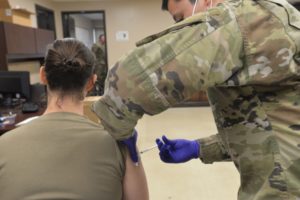National Guard COVID-19 Vaccination Rates Have Lagged

An Indiana National Guard Soldier with the 38th Infantry Division received a COVID-19 vaccination in October. Photo by Sgt. 1st Class Ashley Lovett
WASHINGTON — The DoD is moving steadily toward its goal of vaccinating all military personnel. By early November, 97% of the DoD’s active-duty force had received at least one dose of COVID-19 vaccine.
An MHS press release said that included 99% of active-duty sailors, and with active airmen closely behind it, around 97%, and the Marine Corps is at 93% with one dose. The Army was also in the 90th percentile when it came to active-duty personnel.
As of Nov. 24, more than 1.5 million active-duty troops had been fully vaccinated, and about 323,000 partially vaccinated, according to DoD’s Coronavirus Response website.
Including servicemembers and beneficiaries, more than 6.2 million doses of COVID-19 vaccinations had been administered by the MHS at that point. Recipients either got all shots necessary to be immunized against SARS-CoV-2 or had at least one of a two-dose regimen of vaccines from Pfizer-BioNTech or Moderna or the one dose required for the Johnson & Johnson/Janssen vaccine.
In August, Defense Secretary Lloyd Austin III mandated that all servicemembers, including those in the National Guard and Reserves, be vaccinated against COVID-19. Vaccinations have been ongoing since around mid-December 2020.
Pentagon spokesperson John Kirby said in a press briefing at the beginning of last month,
“So, just in terms of first dosage, there’s been a lot more progress, and we continue to see the men and women of the force doing the right thing, which is getting vaccinated.”
Acting Assistant Secretary of Defense for Health Affairs Terry Adirim, MD, MPH, MBA, said of this milestone: “We are proud that our servicemembers and beneficiaries have taken the opportunity to protect themselves against COVID-19. This is an important step for maintaining operational readiness and making the military community safer for our servicemembers and their families.”
“COVID trends are moving in the right direction. At least in part due to our vaccination efforts, there are fewer infections, hospitalizations are down, and lives are being saved,” said Army Lt. Gen. Ronald Place, MD, director, Defense Health Agency, at an earlier press briefing.
“While we’ve reached an important milestone, there’s more to be done.”
All service branches have set deadlines for getting their entire force vaccinated, MHS said.
- Airmen and Space Force Guardians had to be fully vaccinated —including a two-week period after a final shot —by Nov. 2. Air guardsmen and reservists have until Dec. 2.
- The Army deadline for all active duty soldiers is Dec. 15. Guard and reserve troops have until June 30.
- The Navy deadline was Nov. 28 for active duty sailors and Marines and Dec. 28 for reservists.
Mandates for guard members and reservists have seen the greatest pushback. Media reports suggest that only half of soldiers in the Army National Guard have been fully vaccinated.
Questions also have been raised about whether states can interfere with the DoD order. For example, Brig. Gen. Thomas Mancino, the adjutant general for Oklahoma, acting at the behest of Gov. Kevin Stitt, notified the state’s National Guard soldiers and airmen that they would not be required to get their shots.
Kirby responded in a press conference that the Secretary of Defense has the authority to require guard members to get vaccinated against COVID-19, noting, “It is a lawful order for National Guardsmen to receive the Covid vaccine. It is a lawful order.”
Executing the Mandate
“Refusing to do that, absent an approved exemption, puts them in the same potential [for disciplinary action] as active-duty members who refuse the vaccine,” he added.
Kirby said, however, that Austin has made it clear to the military services that “he wants them to execute the mandate with a sense of compassion and understanding.”
He added, “it’s his expectation, as well —and I know he’s made this clear to them that he knows, as a former commander himself, that leaders have a range of tools available to them to help troops make the right decisions for themselves, for their units, for their families, short of using the Uniform Code of Military Justice —therefore, short of punitive measures, and I think that’s —it remains his expectation today, that commanders will do that.”
Kirby called the mandate a “lawful order” and said military leadership trusts that commanders will “ultimately do what they need to do for the readiness of their unit, and if that comes to doing something of a punitive nature, they certainly have that right and that authority. It’s just that the secretary wants them to exhaust other measures before having to do that.”
He added that the Uniform Code of Military Justice offers a menu of options for dealing with violations of lawful orders, but that, ultimately, commanders at local levels will make the decision to use administrative or punitive measures to enforce the mandates.
In terms of COVID-19 vaccine mandates for DoD employees, more than 96% have had at least one dose of vaccine or have requested an exception or extension, according to White House data released in late November. Another 93.4% of agency employees covered by a vaccination requirement had at least one dose of a COVID-19 vaccination by Nov. 23.
“We have provided guidance to DOD civilians about the exemption process. They can apply for exemptions,” Kirby pointed out. “They don’t all have to be religious in nature, so that they have been informed about that process. What we owe the workforce is a more clear sense of how those exemptions will be adjudicated. And we’re working on that right now.”
